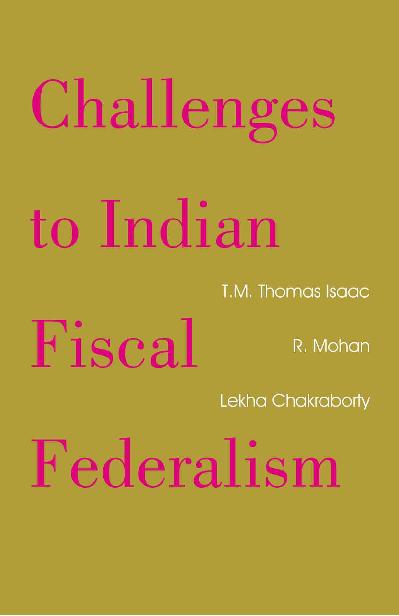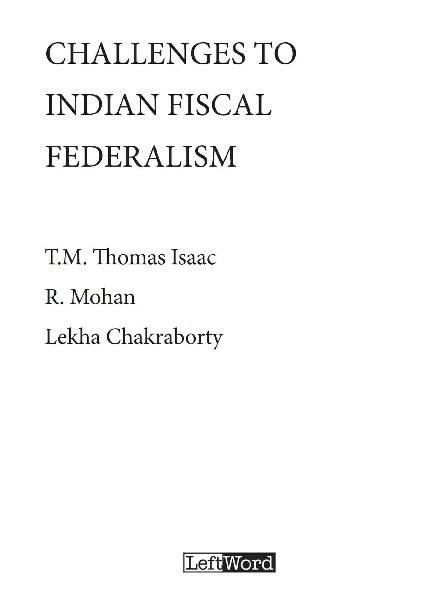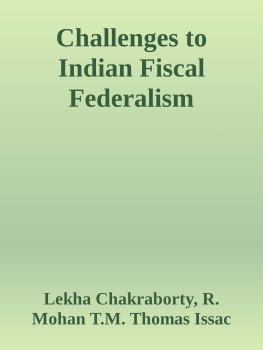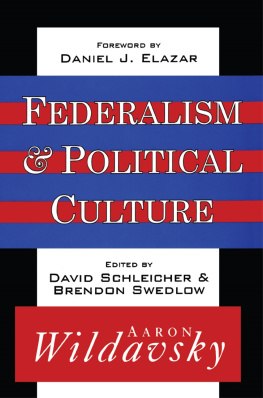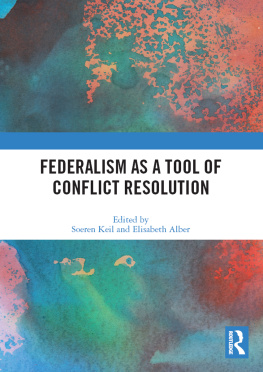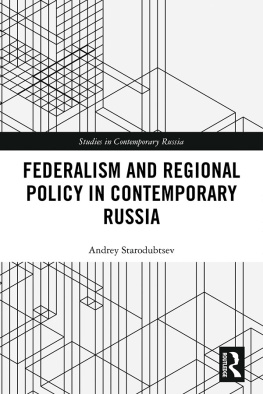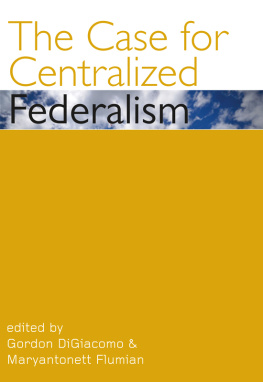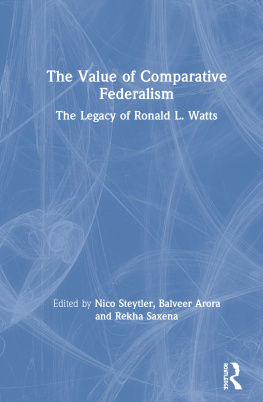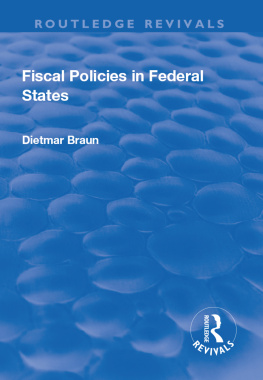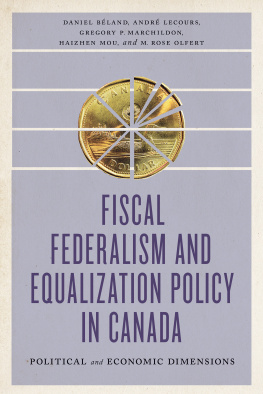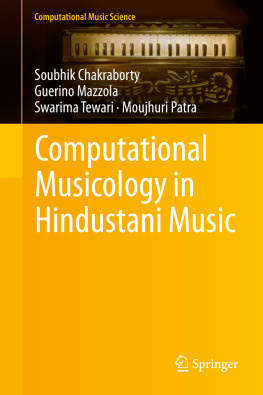T.M. THOMAS ISAAC is the Minister of Finance of Kerala, an office he previously served from 2006 to 2011. Author of numerous academic papers and books, he was Professor at the Centre for Development Studies, Thiruvananthapuram. During his tenure as a member of the Kerala State Planning Board, he was in charge of the Peoples Plan Campaign, a landmark in decentralized planning. He is the author, with Michelle Williams, of Building Alternatives: The Story of Indias Oldest Construction Workers Cooperative (LeftWord 2017), and with Richard W. Franke, of Local Democracy and Development: Peoples Campaign for Decentralised Planning in Kerala (LeftWord 2000).
R. MOHAN took voluntary retirement from his position as Commissioner of Income Tax (Appeals) in 2016. He is currently a Senior Consultant in Gulati Institute of Finance and Taxation (GIFT) and Visiting Fellow, Centre for Development Studies (CDS). He is a member of Kerala Public Expenditure Review Committee. He is the author of several research papers.
LEKHA CHAKRABORTY is Associate Professor, National Institute of Public Finance and Policy, New Delhi, and Research Scholar, The Levy Economics Institute of Bard College, New York (NY), USA. She is the author of Fiscal Consolidation, Budget Deficit and Macroeconomic Activity: Monetary Fiscal Policy Linkages (New Delhi 2016).
CHALLENGES TO INDIAN FISCAL FEDERALISM
First published in January 2019
E-book published in February 2019
LeftWord Books
2254/2A Shadi Khampur
New Ranjit Nagar
New Delhi 110008
INDIA
LeftWord Books is the publishing division of Naya Rasta Publishers Pvt. Ltd.
2019, T.M. Thomas Isaac, R. Mohan, Lekha Chakraborty
leftword.com
Dedicated to the memory of
Dr. A SHOK M ITRA
and
P ROF. I.S. G ULATI
whose studies and arguments in the cause of a more balanced federal system have inspired us and whose stance we try to emulate.
CONTENTS
C.P. Chandrasekhar and Jayati Ghosh
TABLES
FIGURES
As persons engaged in academic, legislative and administrative aspects of public finance, the long run trends and the emerging scenario in Centre-State relations have always had a pride of place in our thinking. Issues in inter-governmental fiscal relations in India had earlier provoked many debates leading to the appointment of commissions and amendments to the Constitution. It is our considered opinion that at present, there is a sufficient vacant academic space for a discussion bringing to the fore the challenges facing Indian fiscal federalism. In attempting to fill this gap, we have tried our best to carry forward the scholarly traditions in the studies pioneered by Ashok Mitra, I.S. Gulati, K.K. George, B.P.R. Vithal and M.L. Sastry.
We owe much to the participants of the Southern Finance Ministers conclave held in Thiruvananthapuram on 10th April, 2018, who gave meaningful inputs which we helped us to develop the theme of this book. In this context, special mention is due to C. Rammanohar Reddy, M. Govinda Rao, Sudipto Mundle and V. Bhaskar.
In this endeavour, we have received valuable help and cooperation from many of our colleagues and friends. We have immense gratitude to C.P. Chandrasekhar and Jayati Ghosh for their patience in going through the draft, offering valuable suggestions and writing the foreword. We express sincere thanks to V.G. Manamohan, S. Abhilash, R. Ajithkumar, T.C. Sethunath and S. Rananath of the office of Minister for Finance, Government of Kerala, for data support and secretarial assistance. V. Sriram, Librarian, Centre for Development Studies, Thiruvananthapuram, D. Shyjan, Head of the Department of Economics, University of Calicut, and V.K. Anil Kumar, Laurie Baker Centre for Habitat Studies, Thiruvananthapuram, tendered timely help in providing many relevant references, without which we would not have been able to complete this book in the short time frame.
C.P. CHANDRASEKHAR AND JAYATI GHOSH
The framers of Indias Constitution, faced with the vast size and immense diversity of the country, and conscious of the need to strengthen the national unity generated by the freedom movement, chose a complex, quasi-federal structure. While decentralization and devolution constituted one plank of the founding document, a strong national government was the other. Besides the specific framework of parliamentary democracy, involving elected representation to the State legislatures and the two houses of the national Parliament, the Constitution also allocated governance responsibilities between the Centre and the States. Where that was difficult to do, it took recourse to a Concurrent List of powers, responsibilities for which were ambiguously distributed.
The challenge did not end at that point. Both administration and development require finance, and in actual practice only a small proportion of tax revenues are collected by the State governments. The capacity to mobilize resources is much greater at the national level than at the level of individual States, as the latter are constrained by the level and structure of their incomes. The principle of subsidiarity requires lower levels of governments to undertake development activities which they can do better because of their being closer to the ground. This implies that the spending responsibilities of the States would require financing in excess of what they can effectively mobilize on their own. Further, differences in structural features and uneven development mean that there are substantial differences in the capacities of different States to garner resources, which in turn requires their redistribution. Vertical and horizontal inequities are, therefore, structurally embedded in the system and need to be addressed by combining both principles and flexibility.
To balance the multiple objectives of adequate devolution, addressing inter-State inequalities, and ensuring availability of resources for needed central expenditures, the Constitution provided for a Finance Commission instituted once in every five years to determine the share of resources to be devolved to the States and the principles that should govern the sharing of devolved resources between the States. However, this was not the only route through which resources were transferred to the States. A second channel was support provided to the State plans and for central projects implemented in the States through the Planning Commission, which was not a constitutionally created body, but functioned through discussion with the States. In addition, resources flowed through channels like the Development Finance institutions, which were provided financial support by the Reserve Bank of India and through the central budget. Clear principles of devolution or discussion with the States were largely absent in the case of these latter flows. Thus, in practice, an imperfect multi-channel system for resource flows was created through conscious design, and this needed to be revisited periodically to ensure the fairness that was crucial for strengthening the unity of a socially and economically diverse nation.
An abiding problem has been that, despite the efforts of the founding fathers of the Indian Constitution, the scope for discretion was substantial in the structure determining the sharing of resources between the Centre and the States and among the States. So, commitment to principles, and democratic scrutiny and accountability were needed to ensure that the system served its multiple objectives as best as possible. Needless to say, the actual devolution of resources as it evolved in practice has been controversial right from the start, mainly because of the perception that the Centre has retained for itself a disproportionate share of resources and influenced (for political reasons) the distribution of resources between the States. In addition, some States have felt that they have been unfairly treated in the sharing of devolved resources.
